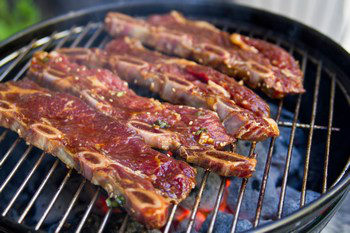How Does Meat in the Diet Take an Environmental Toll?
Our meat consumption habits take a serious toll on the environment. According to the Environmental Working Group (EWG), the production, processing and distribution of meat requires huge outlays of pesticides, fertilizer, fuel, feed and water while releasing greenhouse gases, manure and a range of toxic chemicals into our air and water. A lifecycle analysis conducted by EWG that took into account the production and distribution of 20 common agricultural products found that red meat such as beef and lamb is responsible for 10 to 40 times as many greenhouse gas emissions as common vegetables and grains.
Livestock are typically fed corn, soybean meal and other grains which have to first be grown using large amounts of fertilizer, fuel, pesticides, water and land. EWG estimates that growing livestock feed in the U.S. alone requires 167 million pounds of pesticides and 17 billion pounds of nitrogen fertilizer each year across some 149 million acres of cropland. The process generates copious amounts of nitrous oxide, a greenhouse gas 300 times more potent than carbon dioxide, while the output of methane—another potent greenhouse gas—from cattle is estimated to generate some 20 percent of overall U.S. methane emissions.
“If all the grain currently fed to livestock in the United States were consumed directly by people, the number of people who could be fed would be nearly 800 million,” reports ecologist David Pimentel of Cornell University’s College of Agriculture and Life Sciences. He adds that the seven billion livestock in the U.S. consume five times as much grain as is consumed directly by the entire U.S. population.











